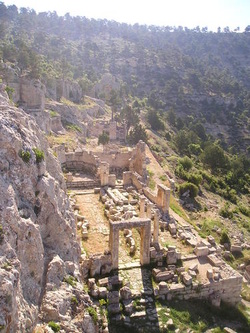
My research positions me well to address course topics across a geographical and chronological breadth, with a focus on the eastern Mediterranean in the common era but not limited to those parameters. I have relied on case studies and comparative material from across the eastern Mediterranean, from Greece to Jordan, with a focus on Anatolia, from Ephesos to Silifke to the northern edge of the central plateau, and am thus equipped to teach various introductory level surveys, as well as more specialized courses on subjects ranging from the Archaeology of Pilgrimage to Monastic Archaeology to 'The Other Wonders of the Ancient World: Technology and Engineering'. I rely heavily on archaeological and anthropological theory in shaping my research questions and methodologies, and thus can teach general courses on archaeological theory or specific theoretical and methodological approaches, such as place theory or survey archaeology. My analysis and spatial modeling of travel infrastructure in a Geographic Information Systems (GIS) environment has prepared me to train students how to use these tools effectively in their own research.
In addition to my own research and teaching experience at the undergraduate and graduate level at Florida State University, I have been a teaching assistant for introductory level classes on Food and Drink in Antiquity, Geophysics, Water, Culture & Power, and on the deep history of the city of Istanbul through the Joukowsky Institute for Archaeology and the Ancient World, all of which I would be comfortable developing as my own courses (some of these form the basis of syllabi I have already developed in detail, found under the Course Syllabi menu). I have outlined my teaching interests below.
TEACHING INTERESTS
|
Topical
|
travel and communications; archaeology of early Christianity; monastic archaeology; food and drink in the ancient world; pilgrimage; city and country in the eastern Mediterranean; archaeology of the body; the late antique and medieval city; ancient mythology (classical or global/comparative); technology and engineering in the ancient world
|
|
Regional and Chronological
|
Anatolian archaeology; near Eastern art and archaeology; Romans in the eastern Mediterranean; Roman archaeology; late antique and Byzantine archaeology; archaeology of the provinces; Rome in the Balkans; Pompeii; Troy; Constantinople
|
|
Method and Theory
|
archaeological survey; landscape archaeology; place theory; movement and connectivity in the Mediterranean; network theory; archaeology and the sacred; history of archaeological thought and practice; -izations (e.g., Romanization, Christianization, globalization); text and archaeology; digital archaeology and presentation of material culture;
|
|
Skills
Literature, Languages, and Translation |
Geographic Information Systems (GIS) for archaeologists (introductory and advanced); historical GIS; classics and the digital humanities
Latin and ancient Greek at the intro and intermediate level; translation and reading in translation courses in Greek and Latin epics (Homer, Vergil); Apuleius; Catullus; Petronius; Greek and Latin hagiography; travel accounts; Pausanias Periegesis; Egeria's Travels; Periplus Maris Erythraei |
